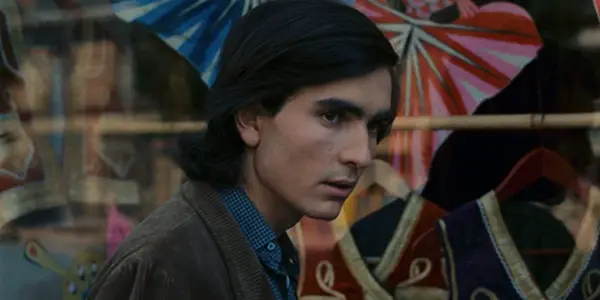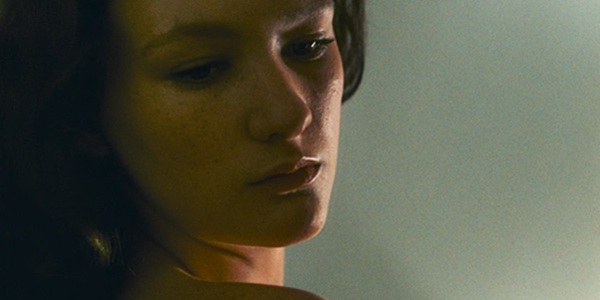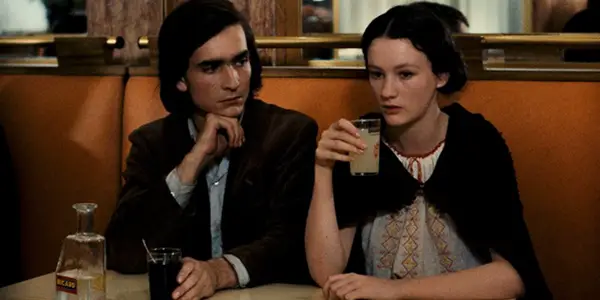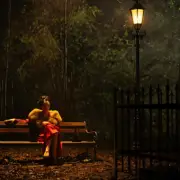FOUR NIGHTS OF A DREAMER: Bresson’s Underseen Ode to Love Found and Lost

Lee Jutton has directed short films starring a killer toaster,…
In Robert Bresson’s Four Nights of a Dreamer, the sights and sounds of Paris are even more vibrant under the cover of darkness than they are by the light of day. Neon signs sizzle and glow, street musicians croon songs of love and longing, and lonely people stand on the crest of the Pont Neuf, wondering if they’ll ever find the one they’re looking for. Paris at night is practically a separate city from the Paris of the day, one with a heady, intoxicating atmosphere where almost anything is possible—even falling in love with a girl you barely know after stopping her from attempting suicide. Largely overlooked among Bresson’s oeuvre of minimalist masterpieces, Four Nights of a Dreamer has now been beautifully restored in 4K by mk2 Films under the supervision of Bresson’s widow, Mylène Bresson, and is bound to enchant audiences anew with its lyrical depiction of love found and lost.
Lovers on the Bridge
Four Nights of a Dreamer introduces us to our unlikely hero, the young artist Jacques (Guillaume des Forêts), as he attempts to hitch a ride from Paris to the countryside for a day spent rambling and whistling through the bucolic landscape. Later, while strolling the streets of Paris at night, he spies a beautiful young woman named Marthe (Isabelle Weingarten) sitting on the edge of the Pont Neuf and contemplating throwing herself into the Seine. Jacques convinces Marthe not to commit suicide; he also promises to meet her the next evening in the same spot at the same time to ensure that she doesn’t succumb to the same temptation then.

What follows are the four magical nights of the film’s title, in which Jacques and Marthe confide in each other about their lives and the reasons they are both unhappy. Through flashbacks, we learn that Jacques constantly falls in love with women he sees on the street but cannot bring himself to approach them, instead using a tape recorder to narrate romantic fantasies about them that inspire his paintings. When an art school classmate shows up at Jacques’s studio and proclaims his own complicated artistic manifesto, Jacques feels ever more disillusioned.
Meanwhile, Marthe lives an uneventful life with her mother (Lidia Biondi) and a series of young male tenants, one (Maurice Monnoyer) with whom she engages in a tentative dance of mutual attraction through the walls of the flat until they finally come face to face and become lovers. When said tenant (who remains unnamed throughout the film) heads to Yale to study for a year, he promises to reunite with Marthe upon his return. However, a year has passed, and he hasn’t appeared, plunging Marthe into despair.
Mood Indigo
Loosely adapted from Fyodor Dostoevsky’s short story “White Nights,” Four Nights of a Dreamer is a story about ideals—romantic ones, artistic ones—struggling to survive in a world that seems intent on crushing them. Marthe would rather die than live with being abandoned by her lover, while Jacques (so aptly designated the dreamer of the film’s title) would rather narrate fanciful stories about women on the street than risk ruining his initial impressions by actually talking to them. Later, he records himself repeating Marthe’s name in a tone that’s part religious chant and part erotic exclamation; he listens to it anywhere from his private flat to the public bus, showing how much the idea of Marthe now dominates his waking and dreaming life.

Jacques offers to help Marthe get in touch with her lover by delivering letters to some mutual friends; she praises him and tells him that she wishes she could love him—this man who is actually here, and who is kind to her—instead of her absent lover, but unfortunately, she cannot. Naturally, this is no consolation for Jacques, who falls deeper and deeper in love with Marthe with each passing night. But why does Marthe continue to love a man that she barely knows, who has been absent for a year, and who has seemingly abandoned her? And why does Jacques fall in love with a woman who cannot stop telling him how much she loves another man instead of him? Anyone who has ever been in love knows that there are no easy explanations; resisting the urge to provide any is what makes Four Nights of a Dreamer such an emotionally resonant film.

It’s also an incredibly sensual one. This was only Bresson’s second film to be shot in color (following another Dostoevsky short story adaptation, A Gentle Woman), and it’s one of his most undeniably lovely to look at. After all, it’s hard to find a more aesthetically pleasing setting than Paris, let alone Paris at night along the Seine as viewed through the lens of master cinematographer Pierre Lhomme. The soft glow of passing boat lights illuminates the deep shadows that lurk under the bridges, while various bands on board and on the shores of the Seine provide an enjoyable diegetic soundtrack that fills the silences between Jacques and Marthe once they’ve run out of ways to dance around what they mean to each other.
Per Bresson’s usual casting preferences, neither lead was an experienced actor before being cast in Four Nights of a Dreamer, though they’re so natural in their roles that you could never tell. (See also: Nadine Nortier in Mouchette, Claude Laydu in Diary of a Country Priest.) Looking like a cross between French New Wave acting icon Jean-Pierre Leaud and New York Knicks courtside icon Timothee Chalamet, Guillaume des Forêts makes Jacques the human embodiment of unrequited love and all of the disappointment it entails, while Isabelle Weingarten brings much-needed humanity to a character that otherwise could come off as very unlikable, especially by the time the film reaches its inevitable yet still heartbreaking conclusion.
Conclusion
With the rich color and texture present in every frame of the film looking positively rejuvenated in 4K, there’s never been a better time for Four Nights of a Dreamer to finally take the prominent place it deserves in Bresson’s filmography.
The 4K restoration of Four Nights of a Dreamer opens at Film Forum in New York on September 5, 2025.
Does content like this matter to you?
Become a Member and support film journalism. Unlock access to all of Film Inquiry`s great articles. Join a community of like-minded readers who are passionate about cinema - get access to our private members Network, give back to independent filmmakers, and more.
Lee Jutton has directed short films starring a killer toaster, a killer Christmas tree, and a not-killer leopard. Her writing has appeared in publications such as Film School Rejects, Bitch: A Feminist Response to Pop Culture, Bitch Flicks, TV Fanatic, and Just Press Play. In addition to movies, she's also a big fan of soccer, BTS, and her two cats.













